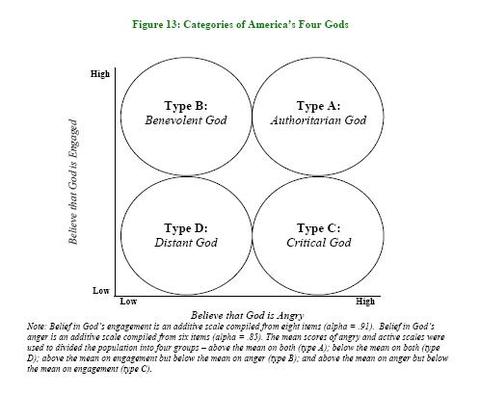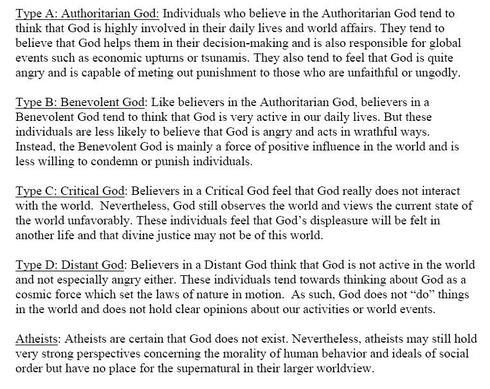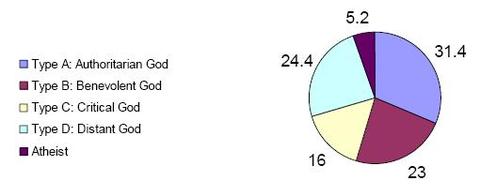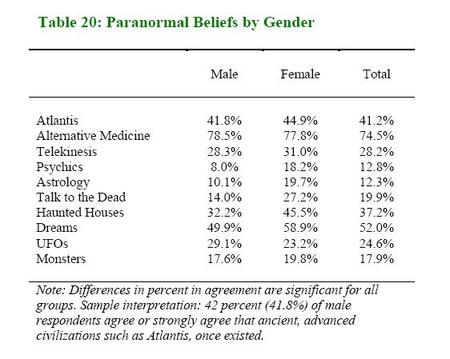There’s a lot of interesting stuff in the recently released Baylor Religious Survey. This is supposedly the most extensive survey of religious attitudes in America. Specifically, the data examines such questions as:
• Just how religious is America?
• Do religious Americans favor any political party?
• How do religious Americans feel about the Iraq war?
• How does religious belief affect spending patterns in America?
• How do people’s perceptions of God affect their view of government and their religious practices?
You can find a general article about the survey here.
And although they’re still crunching the numbers, they’ve already issued one report of "selected findings", which is here (PDF format).
At one point in the report, there is a discussion about the characteristics of God, and where She/He lands on a two-dimensional scale. On dimension measures God’s level of engagement — the extent to which God is directly involved in worldly and personal affairs. The other dimension measures God’s level of anger toward individuals who commit sins and His tendancy toward punishment of sinners.
From these two dimensions, we get Four God types: (1) a high-engagement, high anger God (the "Authoritarian God"); (2) a high-engagement, low anger God (the "Benevolent God"); (3) a low-engagement, high anger God (the "Critical God"; and (4) the low-engagement low-anger God (the "Distant God")
From this, you can survey people as believing in one of these four gods (and a fifth category, atheism):
So where do we fall as a nation?
But here’s some things that surface when this is cross-factored with other parts of the survey:
- Women tend to believe in "engaged" Gods ("Authoritarian" or "Benevolent"), while men tend to believe in unengaged Gods ("Critical" or "Distant")
- Those with less education and less income tend to believe in "engaged" Gods ("Authoritarian" or "Benevolent"), while those making over $100,000 tend to believe in a Distant God or atheism
- Region of the country plays a factor. Easterns trend toward a Critical God. Southerners trend toward an Authoritarian God. Midwesterners trend toward a Benevolent God. Westerners trend toward a Distant God.
- God’s anger alone seems to have no effect on people’s desire to engage in prayer or go to church.
- Not surprisingly, those who believe in an Authoritarian God are more likely to oppose abortion in all circumstances, oppose gay marriage, support President Bush, support the Iraq War, oppose co-habitation, etc., etc.
- Conversely, those who believe in a Critical God are more likely to favor equal distribution of wealth, affirmative action programs, and protection of the environment.
- Another non-surprise: very few who believe in a Distant God — only 0.3% of them — think it is important to convert others. But 21% of those who believe in an Authoritarian God think it is important to convert others.
There’s a lot of other neat little factoids spread throughout the initial report. Most are not very surprising, but it nice to see the science. For example:
- Only 4% of Americans believe that God favors one political party over another
The study also takes a look at paranormal beliefs. Here’s a look at paranormal beliefs, broken down by gender:
Anyway, there’s a lot of interesting things in there. So if you’re browsing and bored, check it out.




